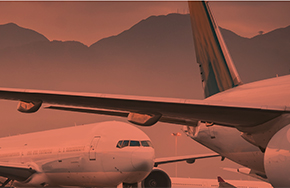 Although coronavirus grounded flights the world over, corporate travel was already under the spotlight as businesses considered their ESG responsibilities. So how might professional relationships be conducted post-Covid? And are those already familiar with remote ways of working at an advantage?
Although coronavirus grounded flights the world over, corporate travel was already under the spotlight as businesses considered their ESG responsibilities. So how might professional relationships be conducted post-Covid? And are those already familiar with remote ways of working at an advantage?
Like most aspects of our lives, corporate travel all but ground to a halt when the coronavirus pandemic took hold earlier this year.
According to the Global Business Travel Association, by May 99% of business trips by European companies had been cancelled or suspended. The sector is expected to take an $820bn (£655bn) revenue hit this year – $190bn of that in Europe alone.
And, as we’ve heard time and again, there’s just no telling if the travel industry will rebound.
Part of the issue is uncertainty. The quarantine system is, and will most likely remain, in a state of flux. At the time of writing, New Zealand, which in June had gone 102 days without a single infection, had been placed on a two-week lockdown. If spikes like this continue, strict cross-border restrictions could be the norm for months, if not years.
But this is not just a coronavirus issue. Experts and commentators have been predicting the death of the ‘single meeting’ business trip for some time, as pressure has mounted on organisations to reduce their carbon footprint.
So, what does the future hold for business travel, and how will relationships fare as a consequence?
Matt Falla, Senior Corporate Secretarial Manager at Praxis Fund Services, believes those who were already set up for remote working will be at an advantage, from a technological and interpersonal perspective.
“Prior to Covid-19, we as a business had heavily invested in systems that allowed staff the opportunity to work remotely,” he says. “So, when Covid-19 hit, the transition wasn’t too much of a shock.”
Ian Rumens, Global Executive Director, Private Wealth, and Head of Private Wealth at Intertrust Jersey, echoes this.
“Working remotely is not a new phenomenon for those from Jersey, because the majority of our advisers and clients are international. So, nothing has really changed in terms of connectivity with colleagues and clients. All we’ve had is that extra step of working away from the office.
“That said, from a digital adoption point of view, we achieved in a matter of months what would have otherwise taken three to five years. Under usual circumstances, we’d have gone through rounds examining various providers and so on, but in this instance our hand was forced.”
Falla experienced something similar. “While we were already set up to work remotely from our peers and clients in some capacity, the pandemic triggered a mass adoption of video conference systems such as Zoom, Teams, Lifesize, Skype, as well as electronic signing and collaboration platforms such as Office365.
“These are all now jostling for position as we emerge from lockdown and into a new world in which people are reluctant to travel – but one where relationships remain more crucial than ever.
“The systems we’re using must, of course, be robust and scalable to accommodate our business needs as they continue to grow and evolve. But the fact that PraxisIFM’s investment in this area had begun some time ago provided an advantage for us as a business to adapt to the Covid-19 scenario.”
Managing relationships
Another potential advantage of the lockdown period has been a renewed focus on managing and maintaining relationships, with businesses realising the need to go the extra mile with existing clients and to find new ways to engage potential ones.
“Covid-19 came with its own challenges and benefits,” says Henry Baye, CEO of Standard Chartered Bank Jersey. “Like all other companies around the world, it truly forced us to step up our efforts, in particular with regards to our client relationships.”
Baye explains that since lockdown, the number of calls being made to clients has doubled every month. “We’ve spoken to more and more of our clients, and we’ve spoken to them more regularly than we have ever done in the past.
“Previously, the focus was on travel – our clients are mostly offshore, so we would travel to see them. But that hasn’t been possible.
“Also during Covid-19, our clients themselves have been more stationary – they haven’t been able to travel as much. So, when we’ve been calling them, they’ve been more available to speak. And I think we all – our employees and clients alike – have enjoyed the more frequent communication. We need to embrace this approach and keep it up as we move forward.”
 Rumens, too, points to the positives of this unique period. “What’s been beneficial about the situation and will, I think, prove to be beneficial even post-Covid-19, is the dramatic rise in visual communications,” he says.
Rumens, too, points to the positives of this unique period. “What’s been beneficial about the situation and will, I think, prove to be beneficial even post-Covid-19, is the dramatic rise in visual communications,” he says.
“Pre-Covid-19, we weren’t using audio and visual means to communicate with the client nearly as much, if at all – just telephone calls. But the likes of Zoom have been great ways to introduce the client to other members of the team for the first time. When I go to Asia, I don’t take everyone with me to meet the client. So, I think that in itself has been important in terms of connecting and ensuring an even stronger bond.”
Rupert Pleasant, Guernsey Finance’s Chief Executive, however, doesn’t believe virtual meetings will altogether supersede face-to-face interactions. “What this is ultimately going to lead to is quite a healthy and interesting mix of how we do business,” he says.
“Many people are extremely happy to conduct meetings via, say, BlueJeans or Teams – but others will continue to relish face-to-face interactions, especially those in business development or client management roles.
“Time will also play a factor,” he adds. “If someone were to fly to London – even if they had five or six meetings booked in – that would be a good day, if not two, out of their agenda. Using a virtual approach, that’s a morning. And it’s much more cost-effective, too.
“Going forward, we’ll see a hybrid of these two approaches, but I don’t think this will be detrimental to relationships in any way, shape or form.”
Planning ahead
Brian Carey, Director of Private Wealth at Intertrust Jersey, remains similarly pragmatic about what the future holds. “I think employers and employees will have different ideas of how they want to do business,” Carey stresses. “But we can’t just let things return to how they were.
“If you were seeing a client six times a year, you’ll be seeing them three times and you’ll be using other means to establish and enhance their trust.
“I also think there will be a lot more requirements in terms of planning trips, ensuring that we get the most out of them.
“The days of going to London for one day are over; you’ll be going for a week. Likewise, week-long trips to the Middle East are behind us too – it’ll be more like two or three weeks.
“But at the end of the day, you do need to be sitting there until the small hours in the morning, having coffee with your clients, because that’s when you establish a real relationship. Because when there are fewer people around, they tell you what really is bothering them, what is literally keeping them up at night.”
Only time will tell what the future of relationship management looks like in a post-Covid-19 era.
What is certain, however, is that virtual has its virtues – even if purely digital experiences look exceedingly unlikely to altogether replace face-to-face ones.
• This article was first published in BL City Edition in October 2020